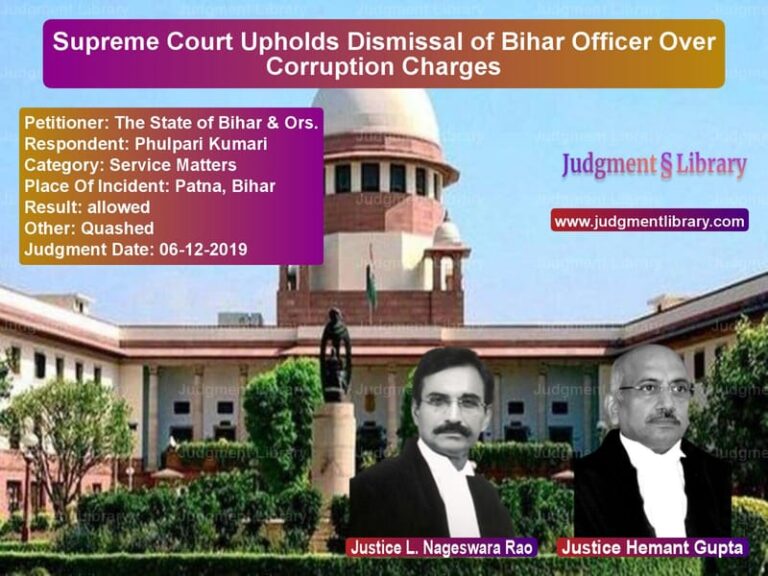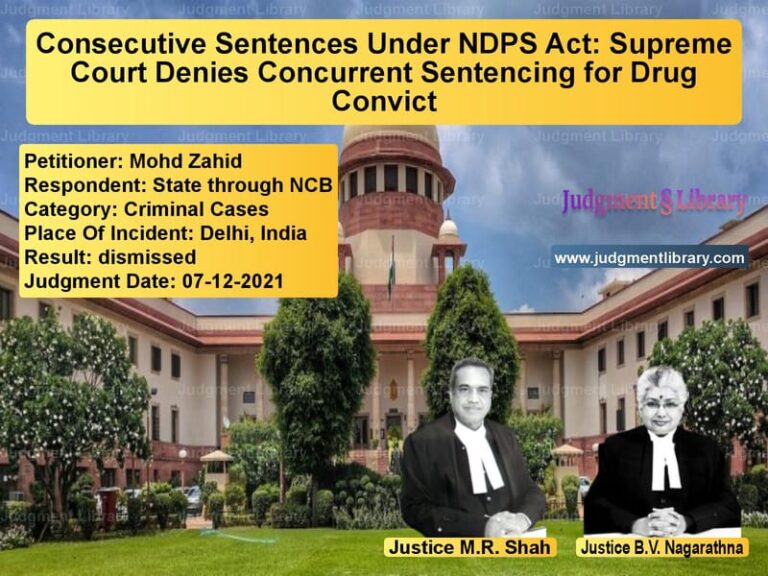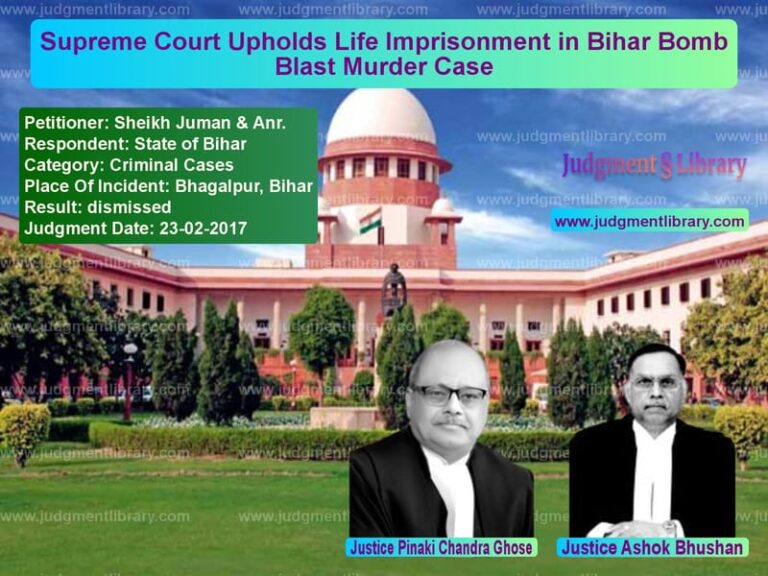Insurance Liability in Self-Caused Accidents: Supreme Court Clarifies Legal Position
The Supreme Court of India, in its judgment dated August 31, 2018, ruled on an appeal concerning a motor accident claim where the deceased was the owner-cum-driver of the vehicle. The case, National Insurance Co. Ltd. vs. Ashalata Bhowmik & Ors., involved a dispute over whether the insurance company was liable to pay compensation when the accident was caused due to the negligence of the deceased himself. The Supreme Court ruled that since the deceased was not a ‘third party’ under the Motor Vehicles Act, the claim petition under Section 166 was not maintainable.
The judgment provides clarity on the extent of an insurance company’s liability in cases where the vehicle owner is the victim of his own negligent driving.
Background of the Case
The case arose from a fatal accident on May 20, 2012, when the deceased, Dilip Bhowmik, was returning home from Kathaltali while driving his own vehicle (TR-01-U-0530). He lost control and met with an accident near Agartala Railway Station. Despite being rushed to the hospital, he succumbed to his injuries.
The legal heirs of the deceased, including his wife, children, and mother, filed a claim petition under Section 166 of the Motor Vehicles Act, 1988, seeking a compensation of Rs. 68,15,000. The Motor Accident Claims Tribunal (MACT), West Tripura, Agartala, awarded them Rs. 10,57,800 with interest at 8% per annum.
The insurer, National Insurance Co. Ltd., challenged the award before the Tripura High Court, arguing that the deceased was not a third party and that no compensation should be payable. The High Court upheld the award but capped the insurer’s liability to Rs. 2,00,000, based on the personal accident cover in the insurance policy.
Petitioner’s Arguments
The insurance company, represented by its counsel, contended that:
- The deceased was the owner-cum-driver of the vehicle and not a third party.
- The accident was caused due to his own negligence, and thus his legal heirs could not claim compensation under Section 166 of the Motor Vehicles Act.
- The High Court erred in directing the insurer to pay Rs. 2,00,000 as compensation.
- Liability under the insurance contract was limited to third-party claims, and the personal accident cover, if applicable, was a matter of contractual indemnification.
Respondent’s Arguments
The legal heirs of the deceased, on the other hand, argued that:
- The insurance policy covered personal accident benefits, and they were entitled to compensation under the same.
- The Tribunal had assessed compensation based on the deceased’s income and the loss suffered by his dependents.
- The High Court had already reduced the compensation significantly, and the insurer’s challenge was unfounded.
Supreme Court’s Observations
The Supreme Court examined the case in light of previous judgments, including Oriental Insurance Co. Ltd. vs. Jhuma Saha (Smt.) (2007) 9 SCC 263, and held that the insurance company was not liable beyond the personal accident cover. The Court stated:
“The deceased being the owner of the offending vehicle was not a third party within the meaning of the Act. The deceased was the victim of his own action of rash and negligent driving. A claimant cannot maintain a claim on the basis of his own fault or negligence.”
It further ruled:
“Liability of the insurer is to indemnify the insured against third-party claims. Thus, if the insured cannot be fastened with any liability, the question of the insurer being liable to indemnify does not arise.”
Final Verdict
The Supreme Court ruled:
- The insurance company had no liability under Section 166 of the Motor Vehicles Act since the deceased was not a third party.
- The insurer was only liable to pay Rs. 2,00,000 as per the personal accident cover in the policy.
- The insurer was directed to deposit Rs. 2,00,000 with interest at 9% per annum within four weeks.
Conclusion
The ruling in National Insurance Co. Ltd. vs. Ashalata Bhowmik & Ors. sets a precedent for motor accident claims where the vehicle owner is the victim of their own negligence. The Supreme Court’s judgment reinforces the principle that insurance policies primarily indemnify third-party liabilities and that self-caused accidents do not entitle legal heirs to compensation beyond personal accident coverage.
Petitioner Name: National Insurance Co. Ltd..Respondent Name: Ashalata Bhowmik & Ors..Judgment By: Justice N.V. Ramana, Justice S. Abdul Nazeer.Place Of Incident: Agartala, Tripura, India.Judgment Date: 31-08-2018.
Don’t miss out on the full details! Download the complete judgment in PDF format below and gain valuable insights instantly!
Download Judgment: National Insurance C vs Ashalata Bhowmik & O Supreme Court of India Judgment Dated 31-08-2018.pdf
Direct Downlaod Judgment: Direct downlaod this Judgment
See all petitions in Motor Insurance Settlements
See all petitions in Compensation Disputes
See all petitions in Legal Malpractice
See all petitions in Judgment by N.V. Ramana
See all petitions in Judgment by S. Abdul Nazeer
See all petitions in partially allowed
See all petitions in Modified
See all petitions in supreme court of India judgments August 2018
See all petitions in 2018 judgments
See all posts in Insurance Cases Category
See all allowed petitions in Insurance Cases Category
See all Dismissed petitions in Insurance Cases Category
See all partially allowed petitions in Insurance Cases Category







